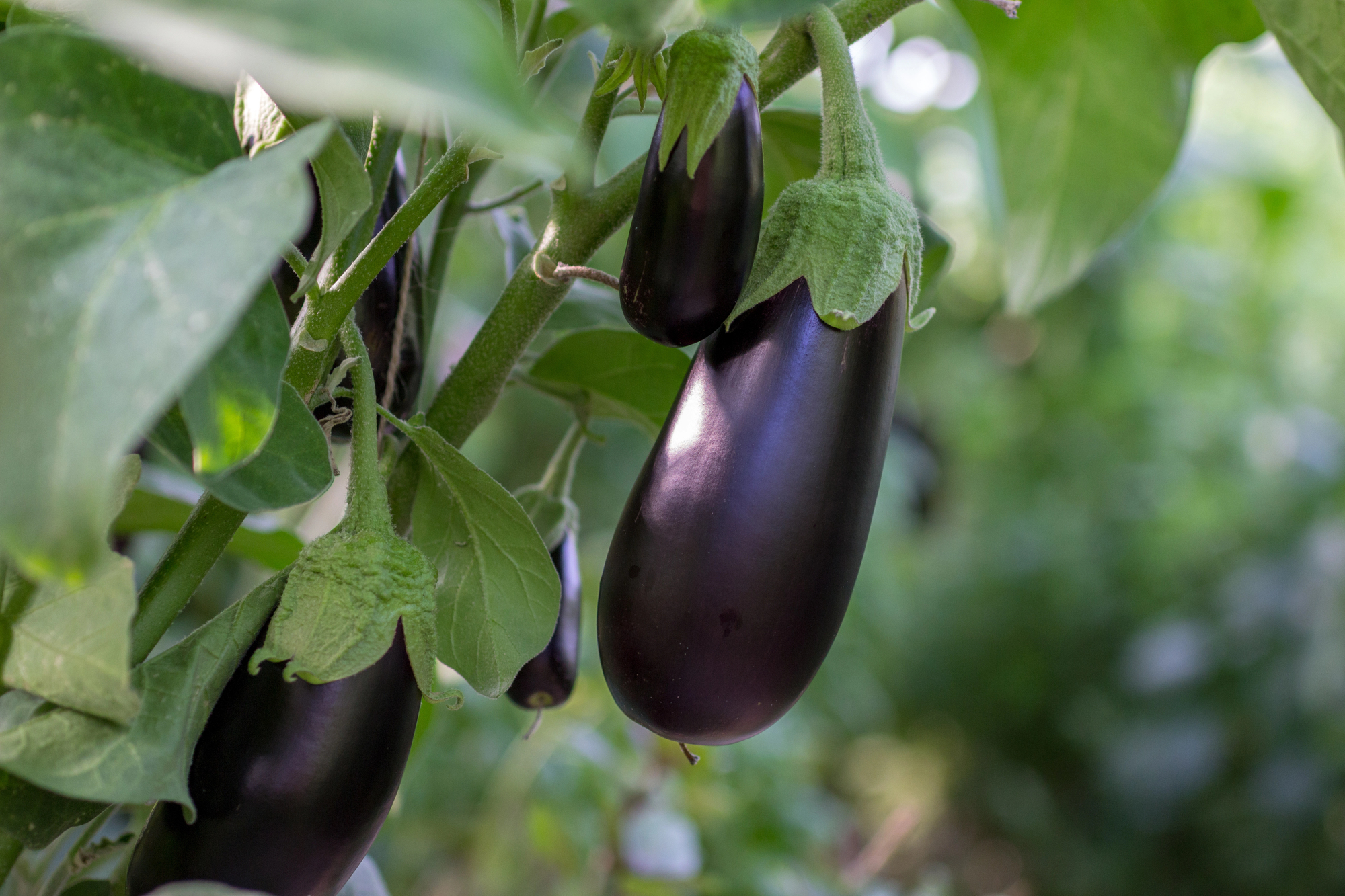Eggplant Donation Tracker
Quick Links: How & Where to Grow | Temperature | How to Care For | Harvest Signs | Harvesting | Pruning | Pests | Companions | Varieties | Preservation | Michigan Tips | Fun Facts
🌱 How & Where to Grow Eggplant:
- Start 8-9 weeks before frost – eggplant needs the warmest conditions of all!
- Needs warmest conditions – transplant mid-June when soil is truly warm.
- Space plants 18-24 inches apart in rows 30-36 inches apart.
- Sunlight: Full sun (8+ hours) absolutely essential.
- Soil Type: Rich, well-drained soil with pH 5.5-6.5.
- Soil Amendment: Heavy feeder – add lots of compost and aged manure
Eggplant is the diva of the nightshade family – demanding perfect warmth but rewarding with gorgeous fruit!
🌡️ Temperature Guidance:
Minimum 70°F soil. Never below 55°F. Most heat-sensitive nightshade.
- Transplanting: Wait for 70°F+ soil – mid-June is typical.
- Growing: Thrives at 70-85°F, struggles below 65°F.
- Growth completely stops below 50°F.
- More heat-loving than tomatoes, peppers, or any other garden crop!
In Michigan, think of eggplant as a July-August crop – they need our hottest weather!
💧 How to Care for:
- Consistent Moisture: Essential for continuous production.
- Watering: 1-2 inches weekly – never let them dry out.
- Mulch: Black plastic mulch is absolutely essential for warmth.
- Fertilizer: Feed every 2 weeks with balanced fertilizer.
- Support: Stake all plants – fruit weight can topple them.
📏 Harvest Signs:
Glossy skin, full size, slight give to pressure. White seeds inside.
- Harvest young for best quality – overripe eggplant becomes bitter!
- Glossy, shiny skin indicates perfect ripeness.
- Dull skin means overripe – will be bitter and seedy.
- Press gently – slight give but springs back.
- Cut one open – seeds should be white, not brown.
Size varies by variety – know your type’s mature size!
🧺 Harvesting:
Cut close to fruit. Harvest young for tenderness.
- Always use sharp knife or pruners – stems are tough.
- Cut close to fruit leaving cap and short stem.
- Handle carefully – skin bruises easily.
- Harvest frequently – every 2-3 days in peak season.
- Morning harvest for best quality and storage.
✂️ Pruning:
Pinch growing tips. Remove lower leaves. Keep 4-6 fruits per plant.
- Pinch growing tip when plant reaches 12-16 inches to encourage branching.
- Remove lower leaves once established for better airflow.
- Thin fruits – keep 4-6 per plant for best size.
- Remove suckers below first fork like tomatoes.
- Late season: Remove flowers 4 weeks before frost.
🪲 Michigan Pests:
Flea beetles (major), verticillium wilt, spider mites.
- Flea beetles – worst pest! Riddle leaves with tiny holes. Use row covers.
- Colorado potato beetles – also love eggplant. Hand-pick daily.
- Verticillium wilt – soil disease. Rotate crops, choose resistant varieties.
- Spider mites – thrive in hot, dry weather. Spray with water.
🫱🏽🫲🏼 Companions:
Tomatoes, peppers, hot peppers, marigolds.
- Other nightshades share similar needs and care.
- Hot peppers may deter flea beetles.
- Marigolds help with pest control.
- Beans fix nitrogen for heavy-feeding eggplant.
- Avoid fennel and black walnut proximity.
🍆 Varieties:
‘Orient Express’, ‘Nadia’ (cool-tolerant). ‘Patio Baby’ (containers).
- ‘Orient Express’: 58 days, most cold-tolerant, long slender fruit.
- ‘Nadia’: 67 days, Italian type, produces in cool weather.
- ‘Patio Baby’: 45 days, perfect for containers, mini fruit.
- ‘Ping Tung’: 65 days, Asian type, heat and disease resistant.
- For Michigan: Choose varieties under 75 days!
🫙 Preservation:
Freeze blanched slices. Dry. Pickle. Not recommended for canning.
- Freezing: Blanch slices 4 minutes, freeze on trays first.
- Drying: Slice thin and dehydrate for eggplant “bacon.”
- Pickling: Small varieties pickle well with Middle Eastern spices.
- Roasting and freezing: Roast whole, scoop out flesh, freeze.
- Not safe for water bath or pressure canning.
- Fresh storage: Only 1 week – use quickly!
✋🏼 Michigan Tips:
- Black plastic essential.
- Containers for mobility.
- 75-day varieties max.
- Start seeds early – February 15 for strong transplants.
- Pre-warm soil with plastic for 2 weeks before planting.
- Wall O’ Water or cloches extend season.
- Asian varieties often more cold-tolerant than Italian.
- Row covers essential until plants flower.
🧠 Fun Facts:
- Originally white and egg-shaped.
- Purple skin has anthocyanins.
- Called “aubergine” in most of the world – only North America says “eggplant.”
- Member of the deadly nightshade family – leaves are toxic!
- Originally from India, cultivated for 4,000 years.
- Once thought to cause insanity – called “mad apple” in Mediterranean.
- Contains nicotine – but you’d need to eat 20 pounds to equal one cigarette!
- The largest eggplant on record weighed over 5 pounds.


0 Comments